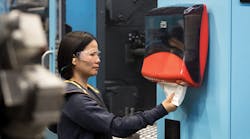Editor's Note: This post was sponsored by Essity.
Industrial organizations traditionally have made sustainable operations a priority for the sake of the bottom line. However, prioritization of corporate social responsibility initiatives in recent years have given sustainability an added dimension, where facilities look outward at their wider environmental impact as well as inward at the bottom line, developing products and services that align with both visions.
Sue Serveiss is the Regional Marketing Manager, Industrial for Tork, and oversees end-customer marketing plans in manufacturing, food processing and transportation and maintenance segments in North America. Tork, an Essity brand, develops, produces, and sells professional hygiene products and services such as dispensers, paper towels, toilet tissue, skincare, napkins, wipers, and intelligent restroom solutions.
Plant Services recently spoke to Sue about how research initiatives conducted by Essity help inform their product strategy and their approach to sustainability.
Q: Sustainability is a clear trend among industry, from reducing greenhouse gas emissions to conserving energy use. Can you talk about some trends you’re seeing, from the C-suite level to the front-line?
A: Research shows people have heightened expectations for hygiene and sustainability where they work. The cleaning industry is essential to addressing these high expectations, especially now that facility managers are challenged to do more with fewer resources.
We’re seeing a definite shift in what employees expect and what our customers need to satisfy those needs. Often, our customers are taking a holistic look at ways to improve their cleaning operations by selecting products that help reduce waste, are efficient, effective and sustainable. By pairing the right hygiene products together, customers are realizing how easy it is to build a cost-effective cleaning program that helps the larger organization meet employee expectations and sustainability goals.
A lot of corporations are realizing the benefits of working towards a more sustainable future and they are seeking partners that can support them in that journey. For example, Essity the maker of Tork products is committed to contributing to the United Nations Sustainable Development Goals (SDGs). In 2020, Essity was once again a convening partner to the United Nations Foundation’s annual Global Dialogue on Goals related to SDGs. In conjunction with the meeting, Essity launched the seventh edition of the Hygiene and Health Report compiled in collaboration with UN Water Supply and Sanitation Collaborative Council (WSSCC).1
With the right partner, facility service managers do not need to compromise between running an efficient operation or complying with their organization’s sustainability objectives. With award-winning sustainable products and expert guidance, Tork can help customers improve business performance through sustainable hygiene management.
Q: What are some of the key takeaways from the Essity-commissioned surveys on sustainability? Did any of the data surprise you, or validate what you’re observing in the field?
A: Since March 2020, more than half of survey respondents said they have higher demands on companies’ sustainability efforts and 56% said sustainability issues had become more important to them personally.2 This was somewhat surprising as we assumed consumers would have a single-minded focus on hygiene following the pandemic. Still, sustainability proved itself to be a top priority. In fact, 90% of respondents to an Essity-commissioned international survey said sustainability would continue to be important to businesses of the future.
As part of our ongoing commitment to sustainability, Essity has strengthened its sustainability commitments. The company introduced a Manufacturing Roadmap program in 2020 which will serve to optimize and streamline all of Essity’s approximately 60 wholly owned facilities for world-class cost efficiency, quality, and service levels. As part of the program, Essity pledged to reach net-zero greenhouse gas emissions by 2050, demonstrating how sustainability and streamlining business operations can work hand in hand.
Essity also launched several innovations that strengthened its customer and consumer offering, improved its product mix, and reduced its environmental impact.1 For example, Tork PeakServe hand towels are FSC® certified, which guarantees that the product is made of fibers from responsibly managed forests and other controlled sources. The towel refills are compressed by 50%, so delivery vehicles and cleaners alike can carry more paper towels at once, reducing their carbon footprint and boosting business efficiency.
We’re seeing that innovations like this promote sustainable hygiene management and ultimately strengthen business performance, improve customer satisfaction and employee wellbeing in addition to operational efficiency and sustainability.
Q: The Tork Biobased Heavy-Duty Cleaning Cloth® is a product that is taking advantage of the latest technologies to help plants achieve sustainability goals. Can you tell us about these cloths and how they help teams meet hygiene expectations?
A: We know teams are under constant pressure to improve productivity and meet sustainability goals, all while maintaining the highest of hygiene standards. With our new biobased product, manufacturers don’t have to compromise.
The Tork Biobased Heavy-Duty Cleaning Cloth is made from 99% plant-based fibers and certified by the USDA BioPreferred Program – slowing down carbon dioxide atmospheric build-up, while performing cleaning tasks as effectively as ever. (Note: the product is USDA Certified Biobased.) Not only are they sustainably sourced, but their packaging is sustainable as well. One hundred percent of its packaging is made from recycled cardboard fibers, and 30% is recycled plastics content, and this is true for all products in the W4 and W7 lines.
In addition to its sustainability efforts, Tork has introduced other upgrades across its wiper product category to increase efficiency. The W7 Handy Box, for example, has been redesigned to be lighter and easier to carry with a larger handle for easier placement while wearing gloves. Other enhancements serve both sustainability and efficiency objectives. Tork Cleaning Cloths are now interfolded to allow for one-at-a-time dispensing, making it easy to grab cloths even when wearing protective gloves. As a result, cloths are more easily accessible and reduce waste by encouraging operators to take only what they need.
The improvements to these products demonstrate the continued commitment from Tork to innovate and limit environmental impact, proving that manufacturers no longer have to choose between productivity and sustainability. They can achieve both at the same time.
Q: What does the future hold for sustainable product innovation?
A: As the survey findings and our experience in the field suggest, sustainability will become more and more important to businesses. Hygiene has always been crucial, but more and more customers are calling for the products they use to be sustainable as well as effective. To meet this demand, new solutions will continue to emerge that are just as efficient but better for the planet.
As the global leader in professional hygiene, we believe in the fundamental importance of hygiene that is inclusive and good for the environment. We have integrated sustainability at the core of our business strategy, focusing on where we can have the biggest impact, and have set high ambitions within our focus areas.
Moving forward, we expect to see innovation in areas like circularity, or reusing existing materials and products as long as possible to combat waste. Another key area for development is doing more with less. Products under this umbrella minimize use and cut waste, with reduced environmental impact and increased cost efficiency as a result.
We look forward to continued innovation in products that improve wellbeing and raise hygiene standards for all. After all, wellbeing is essential for a functioning, sustainable organization.
1 Essity Sustainability Report, 2020.
2 Essity Initiative Survey, 2020-2021.
3 Ipsos, Essity Sustainability 2020
4 Essity Press Release, 2021.
This story originally appeared in the November 2021 issue of Plant Services. Subscribe to Plant Services here.

